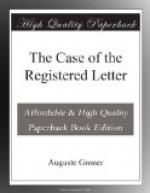Graumann had risen from his sitting position when he saw a stranger. His heavy brows drew down over his, eyes, but he waited for the other to speak.
“I am Detective Joseph Muller, from Vienna,” began the newcomer, when he had seen that the prisoner did not intend to start the conversation.
“Have you come to question me again?” asked Graumann wearily. “I can say no more than I have already said to the Police Commissioner. And no amount of cross-examination can make me confess a crime of which I am not guilty—no matter what evidence there may be against me.” The prisoner’s voice was hard and determined in spite of its note of physical and mental weariness.
“I have not come to extort a confession from you, Mr. Graumann,” Muller replied gently, “but to help you establish your innocence, if it be possible.”
A wave of colour flooded the prisoner’s cheek. He gasped, pressed his hand to his heart, and dropped down on his cot. “Pardon me,” he said finally, hesitating like a man who is fighting for breath. “My heart is weak; any excitement upsets me. You mean that the authorities are not convinced of my guilt, in spite of the evidence? You mean that they will give me the benefit of the doubt—that they will give me a chance for life?”
“Yes, that is the reason for my coming here. I am to take this case in hand. If you will talk freely to me, Mr. Graumann, I may be able to help you. I have seen too many mistakes of justice because of circumstantial evidence to lay any too great stress upon it. I have waited to hear your side of the story from yourself. I did not want to hear it from others. Will you tell it to me now? No, do not move, I will get the stool myself.”




